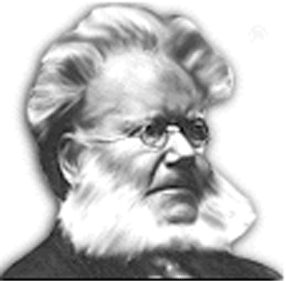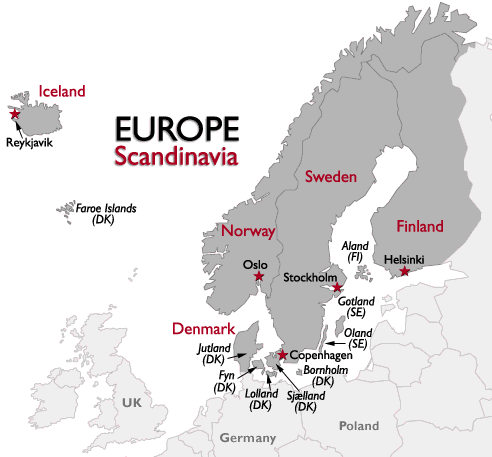Henrik Ibsen (1828-1906)
1828: Born in Skien to a merchant father . . .
1836: Father declares bankruptcy, family leaves mansion
1846: Supports his illegitimate child (mother, servant girl of
employer)
1850-64: Works for Mollergate Theater in Christiania (Oslo)
1867: Peer Gynt
1879: A Doll's House (ET DUKKEHJEM)
1881: Ghosts; Autobiography (unfinished)
1887: Rosmersholm
1890: Hedda Gabler
1891: Returns to Norway
1900: Suffers a series of strokes that leave him unable to write
1906: Dies
A Doll's House in
Context
1792
|
Mary Wollstonecraft's A
Vindication of the Rights of Women in England
|
1848
|
Revolutions in Europe
|
1859
|
Darwin's Origin of
Species
|
1867
|
Louisa May Alcott's novel, Little Women
|
1869
|
Susan B. Anthony begins suffrage movement; John Stuart
Mill's essay "The Subjection of Women" (UK) influences
Norwegian feminist movement
|
1879
|
Ibsen's A Doll's
House (ET
DUKKEHJEM)
|
1888
|
First beauty contest in Spa, Belgium
|
1889
|
Gerhart Hauptmann produces first play, Before Sunrise, at
German Free Theater in Berlin
|
1891
|
Independent Theater produces Ibsen's plays in London
|
1913
|
Shaw writes The
Quintessence of Ibsenism
|
1920
|
Women permitted to vote in USA
|
The "Woman Question" ca. 1879:
- Are women human like men?
- Should women be given rights of citizenship
(right to hold property and money, right to vote,
ability to be educated in all fields)?
- Fear: if women are given their freedom,
they will give up their so-called sacred rights of mothers and
wives?
Quotes from Ibsen:
1) "Whatever I have written has been without any conscious
thought of making propaganda .... I am not even quite clear as to
just what this women's rights movement really is."
Ibsen to the Norwegian League for Women's Rights in Christiania,
26 May 1898, in Ibsen: Letters and Speeches, ed. Evert
Sprinchorn (New York, 1964), 337.
2) Speech to working men of Trondheim in 1885: “The
transformation of social conditions which is now being undertaken
in the rest of Europe is very largely concerned with the future
status of the workers and of women. That is what I am hoping and
waiting for, that is what I shall work for, all I can.”
3) In his notes to A Doll’s House: “A woman cannot be
herself in contemporary society, it is an exclusively male society
with laws drafted by men, and with counsel and judges who judge
feminine conduct from the male point of view.”
Ibsen's Connections:
- the Norwegian feminist Camilla Collett
- Mother-in-law, the Danish writer Magdalene Thoresen, was a "New
Woman" (term used in 1890s)
- In 1879 tried to open post of secretary and secure voting
rights in the Scandinavian Club in Rome to women
Discussion Questions: Doll House
I. FAMILY: How many different familial tragedies occur in
Ibsen’s drama? What is ‘family tragedy’ according to Ibsen? What
does the play say about fatherhood and motherhood?
II. SETTING: What problems happen in the outside world the
audience cannot see but hears about? How does this reflect on the
meaning of the drama’s title?
III. PERFORMANCE: How do you see Nora “performing” throughout the
play? In other words, is she just pretending to be naïve in the
first act, or does she actually evolve/change by the end? Does
that change your (feminist) evaluation of the play?
IV. CLASS: What is the role of class (a.k.a. work and money
relations) in the play? Is the cause of women at all related to
the cause of workers in general?
"THE
ALTERNATIVE 'GERMAN' ENDING
Under strong pressure, and very reluctantly, Ibsen wrote an
alternative ending for the German theatre. Both Maurice in Hamburg
and Laube in Vienna pressed for a 'conciliatory' ending, as also
did Frau Hedwig Niemann-Raabe who was to play Nora on tour. In the
end, ibsen himself provided the following additional dialogue:
NORA. . . . Where we could make a real marriage out of our
lives together. Goodbye. [Begins
to go.]
HELMER. Go then! [Seizes her arm.]
But
first you shall see your children for the last time!
NORA. Let me go! I will not see them! I cannot!
HELMER. [draws her over to the door, left]. You shall see them. [Opens the door and says softly.]
Look,
there they are asleep, peaceful, and carefree. Tomorrow when they
wake up and call for their mother, they will be--motherless.
NORA. [trembling].
Motherless . . . !
HELMER. As you once were.
NORA. Motherless! [Struggles
with herself, lets her travelling bag fall, and says.]
Oh, this is a sin against myself, but I cannot leave them. [Half sinks down the door.]
HELMER [joyfully, but softly].
Nora!
[The curtain falls.]"
(287-88)
From The Oxford Ibsen.
Trans. James Walter McFarlane. Vol. 4. New York and Toronto:
Oxford UP, 1961.
The Master Builder
"Our whole being is nothing but a fight
against the dark forces within ourselves." -- Henrik Ibsen
-
Bygmester Solness written 1892
-
produced 1893 in Berlin, London, Oslo, and Copenhagen
I. What's in a Name?
- Hilda is the "pagan name for one of the Valkyries, 'Hild'
(appropriately enough, since the Valkyries hover over life's
battlefields and select heroes to be transported to Valhalla)"
(Calderwood 629).
- Lysanger refers to the Norwegian word for light;
it does not exist as a place (Ibsen 325).
- Sollness could relate to the Norwegian word for sun (thus
suggesting "sun-worshiping paganism"), the German word for
debt (das Soll, "which emphasizes the incalculable debt of
Christian guilt which has infiltrated and vitiated his pagan
revolt against God"), or the Norwegian word for soloist,
emphasizing his individuality (Calderwood 629).
- Trolls
are part of Norwegian sagas.
II. Discussion Questions
Free Write on Trolls: What do you think Ibsen means by
acting "like a troll" (Ibsen 333; cf. also 350, 356, 369,
378)? How would you describe "the troll inside" you (or your
worst enemy) (Ibsen 369)?
- What does it mean that Solness is a Master Builder?
- Why does Solness let his wife believe that he's
having an affair with Kaja, or take responsibility for a
fire he could not foresee?
- Why does Solness give in to Hilda's fantasy that he
kissed her? (331)
- What do the women in the play represent? What
aspects of Solness might they resemble?
- What is the role of the doctor?
- Why does Solness insist that his wife is so sad b/c
of the twins' deaths?
Works Cited
Calderwood , James L. "The Master Builder and the Failure of
Symbolic Success." Modern Drama 27.4 (Winter 1984):
616-636. Print.
Ibsen, Henrik. "The Master Builder." Henrik Ibsen: Four Major
Plays. Trans. R. Fjelde. Vol. 1. New York: Penguin, 2006. Print.
Stanton, Stephen S. "Trolls in Ibsen's Late Plays." Comparative
Drama 32 (Winter 1998/1999): 541-80. Print.


